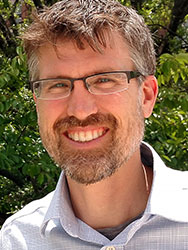
Q and A with Dr Andrew Dykens: Collaboration with Peace Corps in Senegal enhances Fogarty career development award
January / February 2018 | Volume 17, Number 1

Andrew Dykens, M.D., M.P.H.
When Dr. Andrew Dykens was awarded a prestigious Fogarty International Research Scientist Development Award (IRSDA) in 2016, he designed a unique research project in collaboration with the U.S. Peace Corps, with which he volunteered in West Africa in the 1990s. An assistant professor at the University of Illinois at Chicago, where he also heads postgraduate global health education, Dykens is using his IRSDA grant to study cervical cancer in Senegal. He is also a member of the CDC's Global Health and Territorial Research Network, and chairs the Capacity Building Subcommittee of the Consortium of Universities for Global Health (CUGH).
How has your IRSDA grant shaped your career?As a career development award, Fogarty's International Research Scientist Development Award (IRSDA) is providing me with critical research skills. I meet frequently with mentors and get feedback, have taken some courses and attended some conferences, and even in the process of applying for the IRSDA, I learned the importance of thinking through the details of a research project and building it out. You learn to think about how systems can be adapted and strengthened to meet the needs of communities over the long term.Why did you collaborate with the Peace Corps?As a former volunteer, I knew the Peace Corps has extensive experience working with local health services in many low- and middle-income countries and is well-positioned to facilitate research partnerships. This sits well with the focus of my project, which is to improve the quality of health services and strengthen the cervical cancer screening program in a rural region of Senegal.I knew that Peace Corps volunteers are integrated into local communities and work closely with local leaders, so they are able to offer insights into contextual factors. But the Peace Corps does not routinely conduct primary healthcare services implementation research - universities in the U.S. and overseas do that. So I wanted to bring the two together so that they could benefit from each other's strengths. In my observation, the most successful research and implementation projects in rural areas are those that work with deeply integrated partners that have a strong understanding of the local context.How did the Peace Corps enhance your project?When we first contacted them in Senegal, they put us in contact with health officials in the southeastern region of the country, telling the Senegalese officials that we wanted to work within the system and strengthen health services. It was through that relationship that we developed cervical cancer screening as the project's technical approach.One thing we focused on was how to make the project sustainable, how to adapt and strengthen systems in order to meet the needs of communities over the long term. At a practical level, we wanted to work within systems that were already in place, including local methods used to educate and inform people.In Senegal, one way they do this is through an activity called “care groups” - where women are provided with educational materials and are essentially trained as trainers. Once they're done with the training, they return to their homes and share information in a standardized way, ensuring their community is as informed as possible about various health services.Care groups were operating in Senegal long before we started our project, and the Peace Corps is tied to them. So because the Peace Corps truly understands how care groups work in Senegal and understands the contextual piece about how to work with women at the community level, we're working very closely with them to develop that intervention piece.How can a study in Senegal help Americans?Recent reports have shown that there are marginalized groups in the U.S. with cervical cancer rates that are on par with low-income countries. It's ridiculous that anywhere in the world today should have elevated cervical cancer rates, but it's troubling to know that, in as wealthy and resource-rich a country as the U.S., there are groups that still have significant challenges accessing screening services and utilizing those services efficiently.What underlies that are the social determinants of health - education, gender disparities, poverty rates, language barriers. We've found that, although social determinants often materialize in different ways, depending on the country you're in, they are essentially uniform and parallel across nation states, regardless of context. That means what we can learn in a setting such as rural Senegal could very well be applicable to places in the U.S. where there are marginalized populations with similar characteristics, or who are marginalized in a similar way.So I expect that there's a great amount of knowledge we can garner from this type of project, not to mention from many of the other projects Fogarty supports.
More Information
- About Dr. Dyken's IRSDA award Reducing Barriers and Sustaining Utilization of a Cervical Cancer Screening Program in Rural Senegal in NIH RePORTER
- Fogarty's International Research Scientist Development Award (IRSDA)
- Peace Corps
To view Adobe PDF files, download current, free accessible plug-ins from Adobe's website.





















.jpg)









No hay comentarios:
Publicar un comentario